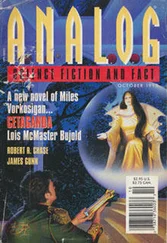And so it goes on. And on. And on. A bit like her novels. Christopher Hitchens once accurately described these weighty tomes as ‘transcendentally awful’. But although the books are unusually bad, they do pull off one clever trick. Rand manages to flatter people like Carswell and Paul Ryan and Rand Paul by telling them that they are the brains and brawn of the world. She tells them they are ‘rational’ and that they are simply following an unbiased, straightforward truth: ‘objectivism’. And the killer blow is that the books are pitched low enough that these not-so-great great thinkers are able to understand them. They are written in basic English, and she keeps the busy plutocrats’ attention by leavening her blunt, simple ideas with emotion, sex, guns, explosions and absurd sci-fi-tinged adventure. Even Donald Trump is a fan.
That’s right. Donald Trump once claimed to have read a book. And according to Trump, this book – Rand’s novel The Fountainhead – ‘relates to everything’. He especially likes the novel’s hero, Howard Roark. Trump has expressed great affinity with this character, who spends 700 pages ranting about everything he doesn’t like in the world and then blows things up when he doesn’t get his way. Who can say what Trump sees in him?
Elsewhere, Rex Tillerson, Trump’s controversial Secretary of State and friend of Vladimir Putin, has said that his favourite book is Rand’s biggest novel, Atlas Shrugged . Atlas Shrugged starts with the famous question ‘Who is John Galt?’ – and then spends 1,200 long pages explaining.
This book is, as the critic Whittaker Chambers noted, a work of ‘shrillness without reprieve’. But it is also compelling. The denouement is particularly mad. It boasts, among other absurd delights, a particle destroyer, a kinky electric torture machine, gratuitous nudity, and a man who introduces himself in the heat of battle and in all earnest as ‘Francisco Domingo Carlos Andres Sebastián d’Anconia’. Such bonkers excitement, combined with the high-pitched urgency of Rand’s writing and her tempting message that it’s okay to be selfish, has appealed to millions of readers over the years. Many of them have gone on to shape our collective destiny.
Talking of destiny, meanwhile, Rand herself lived to the ripe old age of seventy-seven – although in her later years she suffered from lung cancer and set aside her principles so she could claim Medicaid and Social Security. At her funeral in 1982, she had a six-foot floral arrangement in the shape of a dollar sign. Alan Greenspan was there. Five years later, he took over the Federal Reserve. Soon after, the income of the top 1 per cent of households in America began to rise rapidly – while everyone else’s slowed.

Date of birth/death: 31 July 1912 – 16 November 2006
In a nutshell: Free-market fundamentalist preacher
Connected to: Margaret Thatcher, Ronald Reagan, Richard Nixon, Henry Kissinger, George W. Bush
According to The Economist , Milton Friedman is ‘the most influential economist of the second half of the 20th century … possibly of all of it’.
That’s right.
You can blame him.
Before you get too angry, you should also know that Friedman was in some ways an admirable man, as well as an economic genius. His mathematical work at the University of Chicago was brilliant. His papers and books on consumption analysis, the complexity of stabilisation policy and monetary history won him a Nobel Prize. He correctly predicted the stagflation crisis in the 1970s (where high inflation and stagnant demand in national economies blew apart the old post-war consensus). He was also an early defender of gay rights and a forceful critic of the war on drugs.
Okay, he wasn’t universally renowned for his good nature or generosity. When he returned journalists’ calls, he was notorious for reversing the charges. But he was a gregarious and persuasive speaker, sharp in his observations, consistently amusing and clear, even when discussing the arcana of interest rates. He also had a neat way with aphorisms. He was the man who told the world that ‘there is no such thing as a free lunch’.
He also said: ‘The only way that has ever been discovered to have a lot of people cooperate together voluntarily is through the free market. And that’s why it’s so essential to preserving individual freedom.’ Which was a curious thing to hear from someone who had lived through World War II and helped in the worldwide non-market determined struggle to defeat the Axis powers.
Just as tellingly, he once declared: ‘I’m not in favour of fairness.’
What Friedman was in favour of was markets. He reduced everything to a zero-sum game in which consumers have all the power they need in relation to the suppliers of goods and services, because they are able to shop elsewhere if they don’t like what they are getting.
He outlines this idea at the start of the book he and his wife Rose wrote, called Free to Choose . There, he talks about the manufacture of pencils, developing on the famous trope that no one person knows how a pencil is made because the various parts like the lead, the rubber and the brass ferule involve a separate series of mining and manufacturing processes too complex and geographically widespread for any one person to master. Friedman contends that there is also a pencil market controlled by a ‘price system’.
For pages and pages he delineates the complexities of the manufacture, all the different contributions to the pencil, and the way these can vary – the way forest fires, for instance, can impact the price of wood. He also maintains that consumers are always in control of things at the end-point of the process. If prices go up, they can choose to pay more – or choose to make their pencil last longer, or perhaps buy propelling pencils instead.
It all sounds very smart – but misses the essential thing that any eight-year-old can tell you about the actual end-users of pencils. They don’t have any choice. Because they’re eight. They’re school children. They still have to do the same amount of writing no matter how much the pencil may cost. The truth is that if the price of pencils goes up, most people can’t adapt, or look elsewhere. They just suffer …
But Friedman still insists on the primacy of markets, describing them as a kind of perfect system that will correct and control themselves just so long as they are left well enough alone. He doesn’t allow for the fact that consumers don’t always have a choice. Or that sellers will often cheat those consumers.
Friedman’s thinking has led to market structures being imposed in all sorts of ways that they shouldn’t. He spread the belief that competition will magically make the education sector more efficient, instead of turning a public service into another place where shareholders get to soak us. He taught that private providers should control our health systems. His followers decided power companies with confusing tariff plans and ever richer owners are somehow better than nationalised utilities. His close personal friends in the George W. Bush administration – like Secretary of Defence Donald Rumsfeld – were even convinced that private security firms like Halliburton should carry out all kinds of security and administrative work in war zones like Iraq. Which worked out just fine …
It’s terrifying to go back to the source material and see the specious nature of the writing that has had such influence on our lives. There’s plenty more where that pencil theory came from. In Free to Choose , Friedman asks in all earnest how it was that Britain managed to expand its economy even more successfully than the USA in the late nineteenth century, given that Britain didn’t have comparable land and mineral resources? He answers even more seriously that it’s because Britain had a small government and free-market economic policy. He doesn’t mention the country’s huge coal reserves. Or, even more astonishingly, the fact that it had an empire on which the sun never set. Elsewhere, he just makes things up; especially in his many extrapolations about life in the Soviet Union, for which he can’t have had reliable data. But still, millions of people bought the absurd book. It was the non-fiction bestseller in the USA in 1980 and right-wing politicians lapped it up.
Читать дальше













